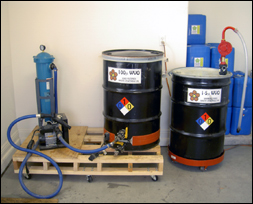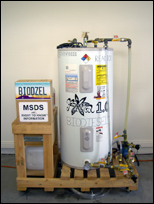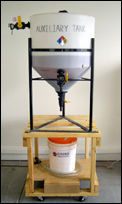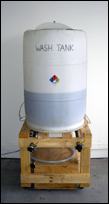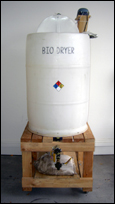| ::: ATLAS BIO'S BIODIESEL THEORY AND PHILOSOPHY :::
In America, circa 2007, there are over three billion gallons (3,000,000,000) of un-tapped, natural and renewable vegetable oil
resources1 that can be converted to eco-friendly, environmentally-sound, American-Made,
ASTM2, OSHA3,
EPA4, IRS5, and
DOE6 recognized fuel.
As per the original engine design7, petroleum in the form of diesel, should be replaced. Without consequence to
the user, this fuel burns cleaner and more efficiently and transpires diesel #2. This fuel is called biodiesel.
Technically and chemically, biodiesel is called "Fatty Acid Methyl Esters". Biodiesel is positively changing the face
of our globe. Biodiesel is better for the environment,
a healthier alternative fuel, and is a natural and
renewable resource. Homemade biodiesel can create a higher standard and a higher quality fuel then you can purchase from a gas station. Home brewing biodiesel
is becoming an American enterprise. Learn the biodiesel facts and truth.
Biodiesel is not magical, nor mythological. Biodiesel is a real commodity,
a liquid fuel, that can dramatically shift the economic climate of the
United States and invigorate individual and localized solidarity (making us safe). Despite the lack of
published data here in the United States, biodiesel runs extremely well in diesel engines. In Europe, where over 50% of all passenger vehicles are
diesel's, over half of them run on biodiesel.
ATLAS BIO, LLC is a successful producer of this fuel. We utilize cost effective, easy-to-assemble biodiesel kits for our localized, small scale production. Recognized
by the United States Government, independent laboratories and real-world users, ATLAS BIO is a legal manufacturer of
ASTM D6751 biodiesel. ATLAS BIO is a vertically-integrated, home-town, small-business and the creator of the best
biodiesel educational guide and #1 biodiesel how-to manual on the planet.
There are many small biodiesel businesses and how-to books and forums out there. Some sell biodiesel equipment and some tell you vaguely how to make biodiesel. We know, we have
either researched and/or analyzed and/or tested most of this equipment and we have either read and/or printed and/or integrated this educational process into our system.
We and/or our affiliates will supply you with biodiesel instruction, biodiesel kits and biodiesel equipment that is proven.
The ATLAS BIO process works for us and it will work for you. We are doing this
because, we recognize that, unlike homogenized, stamped, reproduced,
and franchised corporate entities, our business is different. In the petroleum
boom during the
turn of the century, where Rockefeller8 realized his opportunity to monopolize
the market, we witnessed the birth of the megacorp
called Standard Oil9. What did Standard Oil do? It standardized the
industry by putting in place rigid rules and regulations for the refining of petroleum. The biodiesel boom is different.
Unlike oil fields which only exist in certain regions in the world and our country, vegetable oil is available
everywhere. For the small-scale biodiesel producer, your "oil field" is right
around you. We at ATLAS BIO recognize that we are unable to effectively
tap into your source. Your town, city and/or county requires its own personal
Rockefeller. We empower you to dominate your region and tap into the 3,000,000,000
gallons that are available
each year within the United States. We have standardized the production
of biodiesel. ATLAS BIO's educational guide is the most comprehensive
and effective package for the fastest, most affordable, and exciting way to
produce biodiesel
for your vehicle, family and/or fleet.
We share with you our biodiesel secrets contained within the "A.B.C. 1-2-3".
If you are looking to jump-start your interest in biodiesel, and want to save yourself hundreds of hours and thousands of dollars, this is
where you start.
If your are a seasoned biodiesel producer struggling to meet ASTM specifications, "The A.B.C. 1-2-3"
is where you solve your problems.
We support our friends with proven, detailed documentation and easy-to-understand HD-DVD tutorials. Our biodiesel system is simple and comprehensive, making biodiesel
fun, streamlined and easy-to-follow. If you encounter any problems, you have the ATLAS BIO customer support network
to help solve your biodiesel needs.
We show you the best, the most effective and the most affordable biodiesel equipment vendors. We show you that the positivist, do-it-yourself
approach will save you thousands of dollars. After constructing your
biodiesel equipment and biodiesel kits from hardware resources localized around you, we show you
how to integrate these systems together in a standardized modus operandi. We
show you how to label your equipment and valves which correspond to our
proven and proprietary ATLAS BIO, S.O.P.s (Standard Operating Procedures).
We show you how to secure your resources for the production of biodiesel. We show you how
to operate your biodiesel equipment to its highest potential. We show
you how you can become a legal, U.S. Government, producer and distributor
of biodiesel. We show you how to create ASTM D6751 biodiesel. If you have any
questions, after you actualize "The Biodiesel A.B.C. 1-2-3" system, our
customer support group can provide biodiesel help and solve any biodiesel problems you may encounter.
We show you everything you need to become a successful biodiesel entrepreneur.
The ATLAS BIO, "A.B.C. 1-2-3" is the best biodiesel production guide and the #1 biodiesel educational package
in the world.
|


